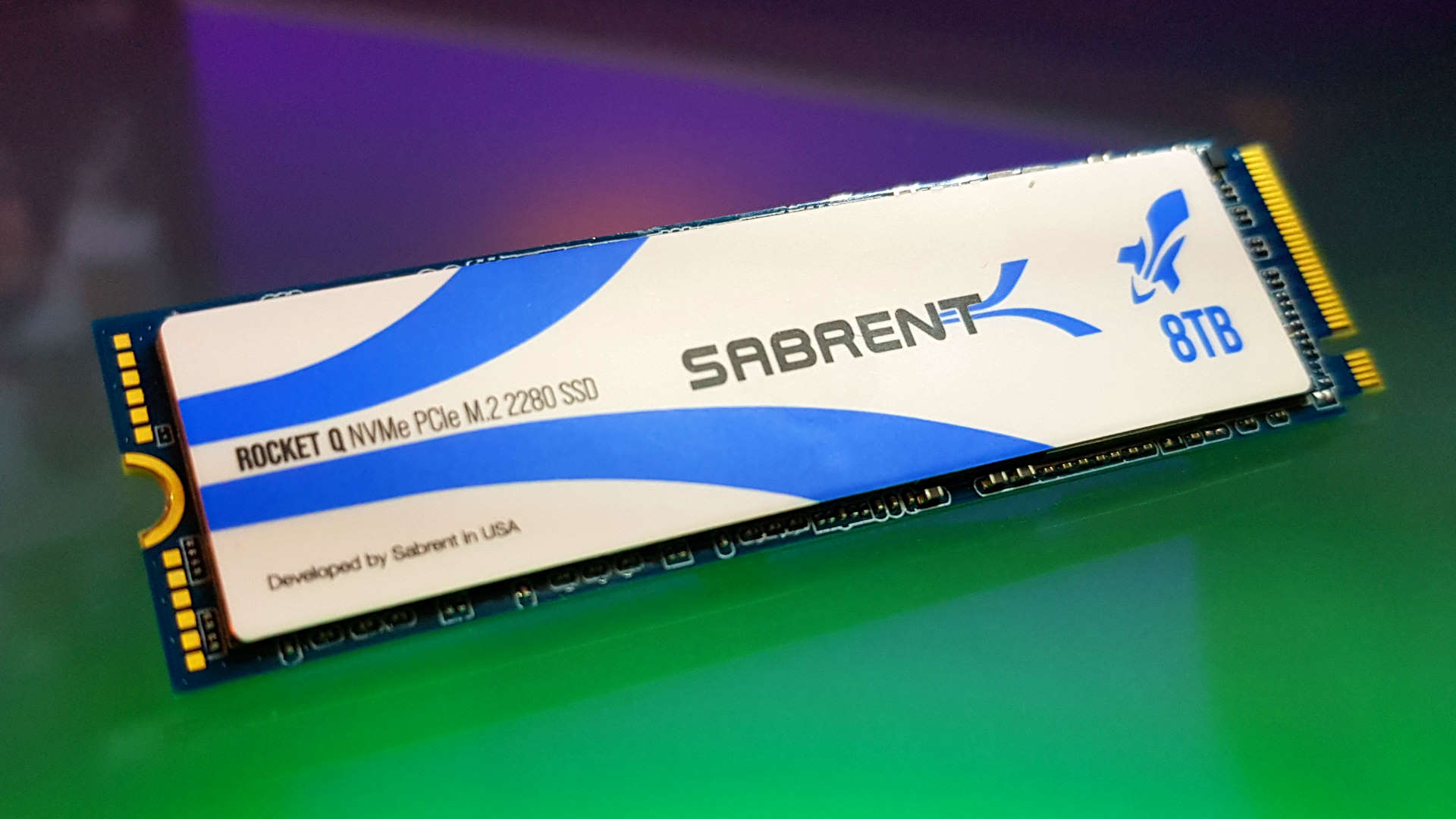Our Verdict
The Rocket Q uses QLC memory to its fullest, using the generally weaker memory tech better than any other drive out there. Mostly thanks to its enormous size.
For
- Huge capacity
- Maintains high speeds despite QLC
- Only around 19c/GB...
Against
- ...but still a huge initial cost
- Has that low QLC endurance
PC Gamer's got your back
The Sabrent Rocket Q 8TB SSD is exactly what QLC was designed for. The high-density quad-level cell memory was specifically created to allow for higher-capacity SSDs, without the associated high cost of speedier NAND memory types. So yeah, finally the best SSDs can be vast, without us having to pay through the nose for it. And how much does this 8TB PCIe drive cost? Wait, what? Nah, I'm out…
Capacity - 8TB
Controller - Phison E12S
NAND - Micron 3D QLC 96 layer
Rated seq. read - 3,300MB/s
Rated seq. write - 2,900MB/s
Warranty - 5 years
Yeah, $1,500 for an SSD—particularly one with what is widely known to be the slowest, weakest NAND memory type known to storage—is a lot to ask. That's more than the cost of an Nvidia RTX 2080Ti, and that already seems like a lot of money. But it's still a pretty chunky graphics card, so still feels like you're getting something tangible for your cash.
This stick-of-gum-sized slice of silicon and printed circuit board? I dunno, man. That's tough.
But that's not the whole of it. That total-cost-of-ownership thing might be hard to deal with, but it does make sense. This is an expensive SSD, but on a price/GB level the Sabrent Rocket Q 8TB is almost as affordable as high-performance solid state storage gets right now. That might seem a borderline idiotic thing to say when faced with a product that potentially costs more than the PC you game on today, but we are talking 8TB here. We're talking about 8,000GB of storage. Work that out on a price per/GB level and you're actually looking at just 19c for every gigabyte of space in this thing.
Well, if there was actually 8,000GB available anyways. But that's a whole other bit of brain-bending mathematics and overprovisioning that we'll come to in a bit.
Suffice to say that an 8TB PCIe drive is unprecedented right now. The Sabrent Rocket Q 4TB was the biggest NVMe SSD we'd seen up to this point, and though Samsung has released its new 870 QVO SSD with an 8TB version that still can't get close to the all-round package this Sabrent drive can offer.
As I said at the beginning, it's all about the QLC memory technology and why the Sabrent uses it better than any other QLC drive we've seen, even other NVMe SSDs.
Without getting too bogged down in the specifics, QLC is effectively 4-bit NAND. The original kind of NAND flash memory used in SSDs was single-level cell (SLC) which is able to hold one bit per cell. Multi-level cell (MLC) was then introduced to bump up density and lower pricing, offering two bits per cell. Then came triple-level cell and now quad-level cell, and there is even the spectre of penta-level cell on the horizon too.
As more bits are stored within a cell, the more the performance suffers, and the endurance level of the drive will drop too. To negate the performance issue MLC, TLC, and QLC SSDs will apportion part of the drive to be used solely as SLC for a storage action, and then transfer data into the QLC part of the drive once it's not being used.
On standard SSDs the amount of SLC cache used will be relatively small, and that means large transfers can saturate the cache quickly, so half-way through copying a game install you might slow to a crawl as you get to experience the real performance of QLC. But on this 8TB drive that cache is about a quarter of the available capacity, meaning you have to be transferring over 2TB of data before you start to see any sign of the QLC memory performance cliff.
Basically, this is a QLC drive that will effectively perform like an SLC SSD for pretty much anything that most human beings will throw its way. And, because of the PCIe 3.0 NVMe interface that means it's pretty damned fast.
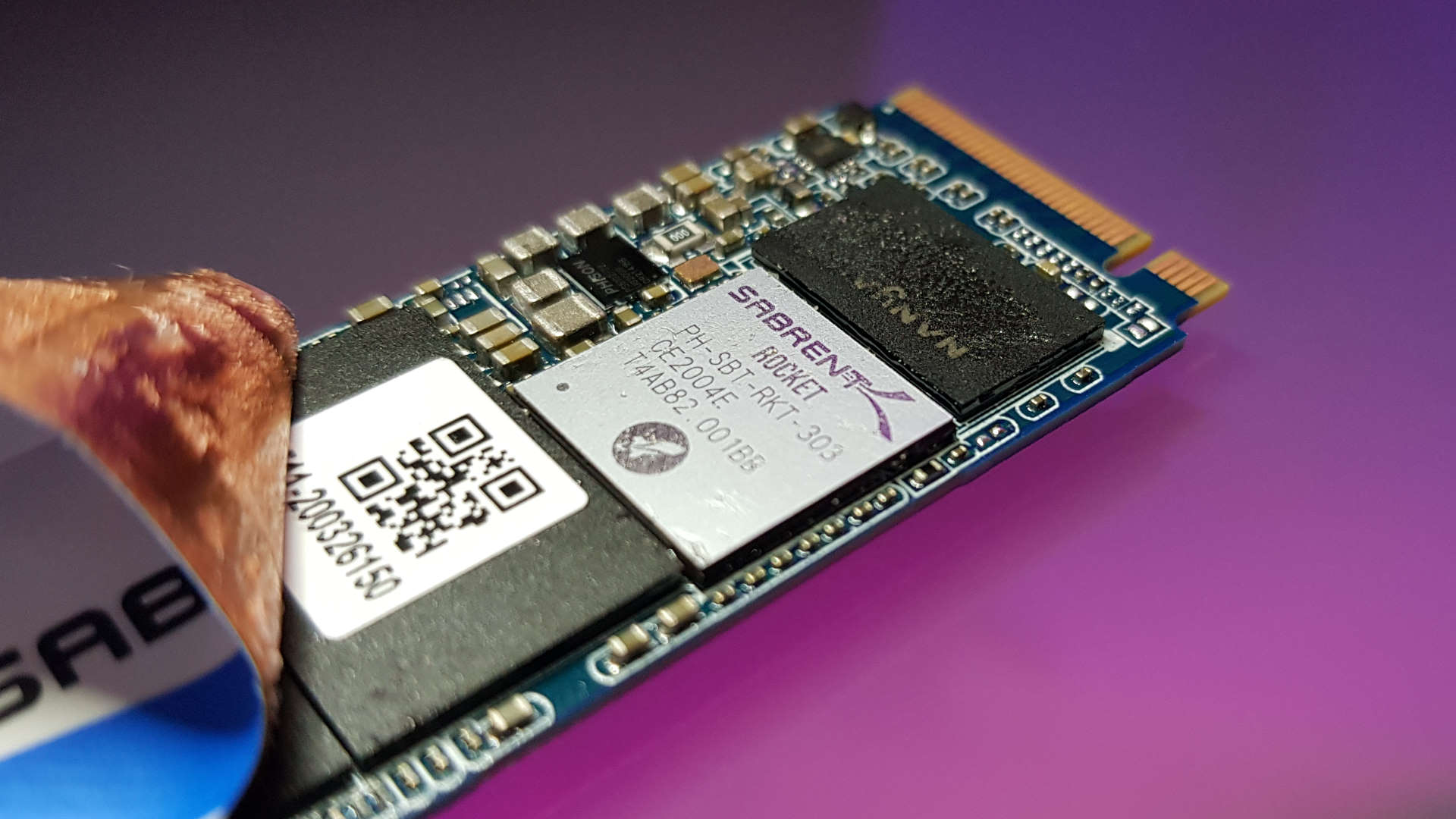
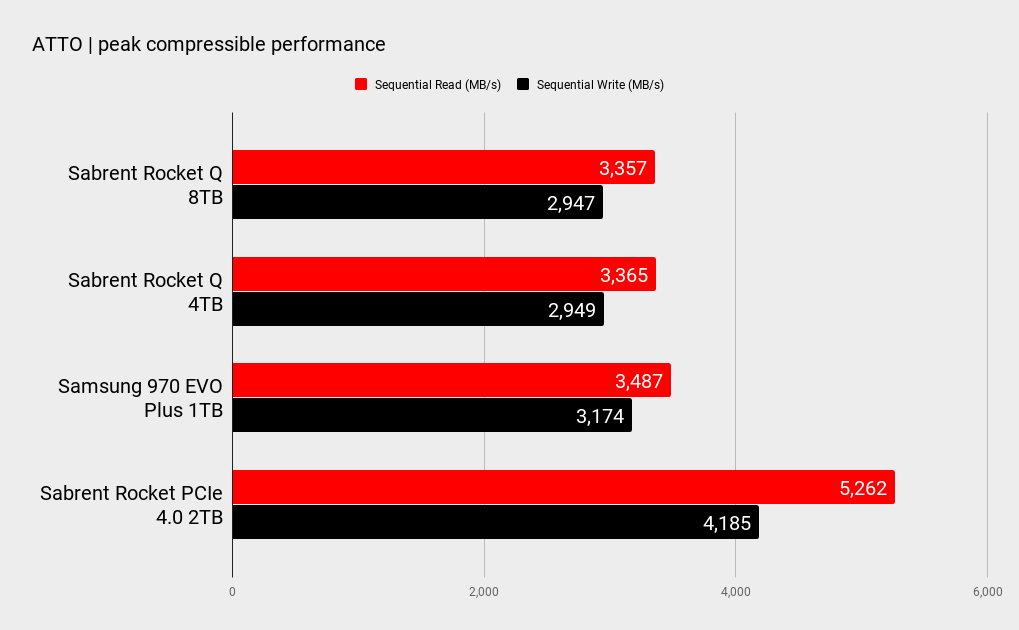
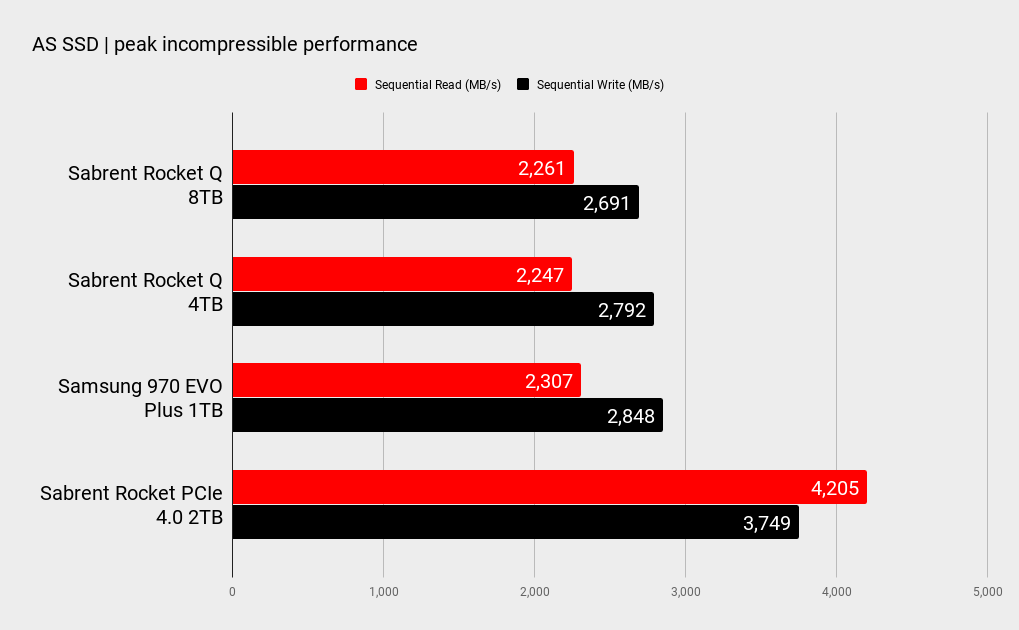
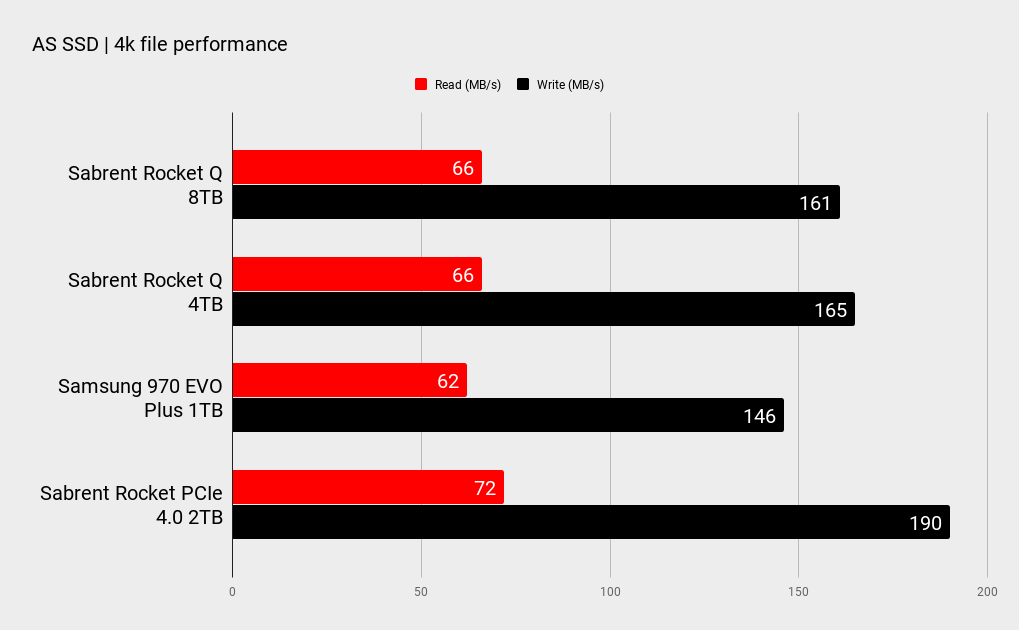
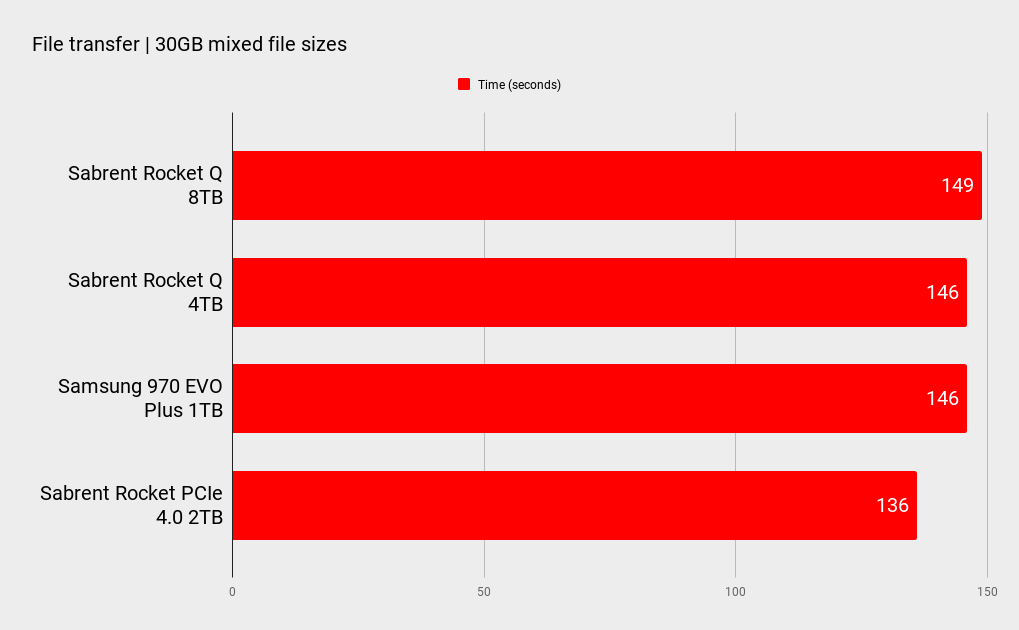
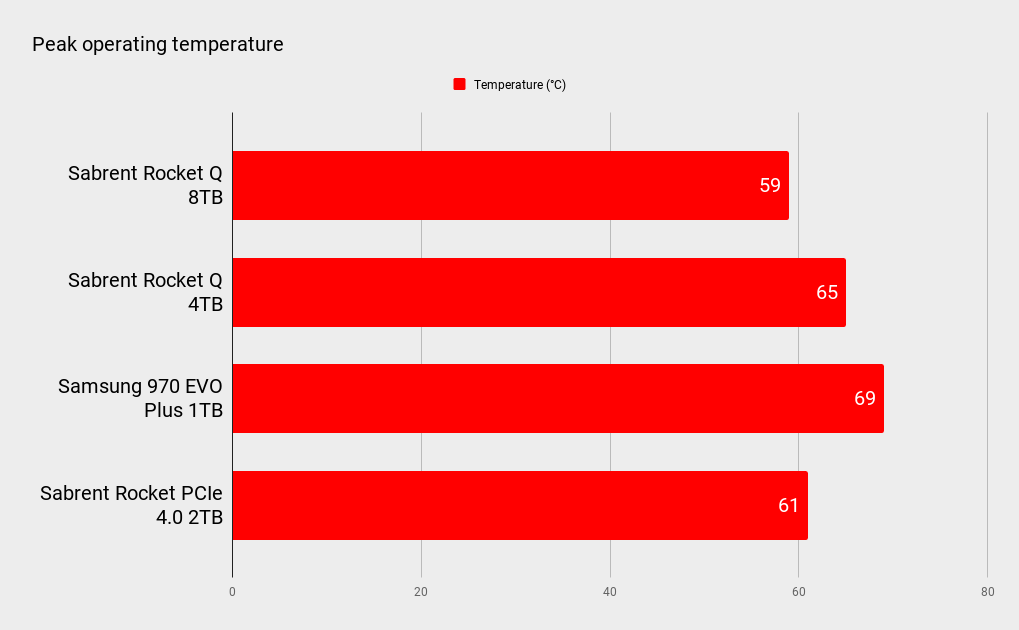
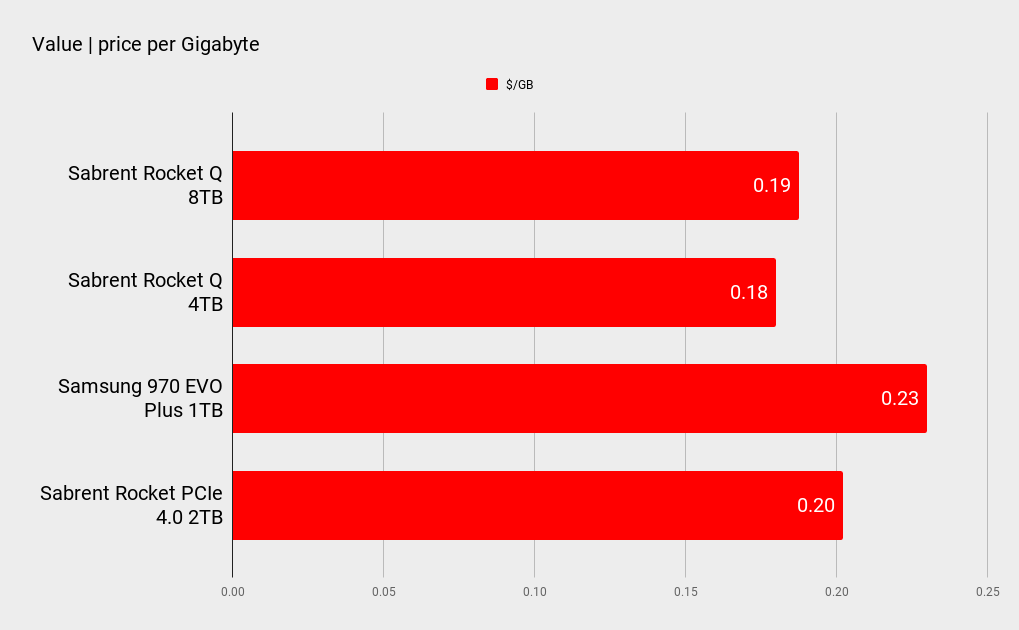
Inevitably it can't hold a candle to the speeds you'll pick up from a PCIe 4.0 SSD, such as its Sabrent Rocket stablemate, but it's right up there with the fastest current consumer Samsung SSD, the 970 EVO Plus. It is a little behind on the raw numbers, but not in any way that would make a tangible difference to your PC setup. There is a Samsung 980 Pro (and surely an EVO too) on the way soon, offering to up the ante on PCIe 4.0 drives, but that's still a ways off, and there's practically no chance you'll find one of those with 8TB of space inside it.
If you were worried about the potential heat generation of an NVMe SSD packed to the gills with high-performance NAND flash memory, and a controller working its socks off keeping them in use, I wouldn't be. Throughout my testing, including extended synthetic storage tests as well as traditional, real-world file transfers, the Sabrent Rocket Q 8TB never got above the 59°C mark.
I've been seriously impressed by Sabrent's recent SSD efforts. We've seen its drives pop up on the affordable end of the solid state spectrum, and were not necessarily convinced they would be anything apart from slow, budget SSDs. But that's why we test, because from the PCIe 4.0 Rocket to the QLC Rocket Q they're demonstrably quality drives.
We've not been huge fans of QLC since it was introduced. The first Samsung 860 QVO drives were achingly slow—and that hasn't really changed with the latest Samsung 870 QVO—and the Crucial P1 and P2 SSDs haven't exactly filled us with confidence that QLC is the future of low-cost, high-density storage. With the Rocket Q, however, things are different. Mostly that's down to the sheer weight of capacity (and seriously these wee SSDs are heavy), but also the mix of memory, Phison controller, and firmware certainly help.
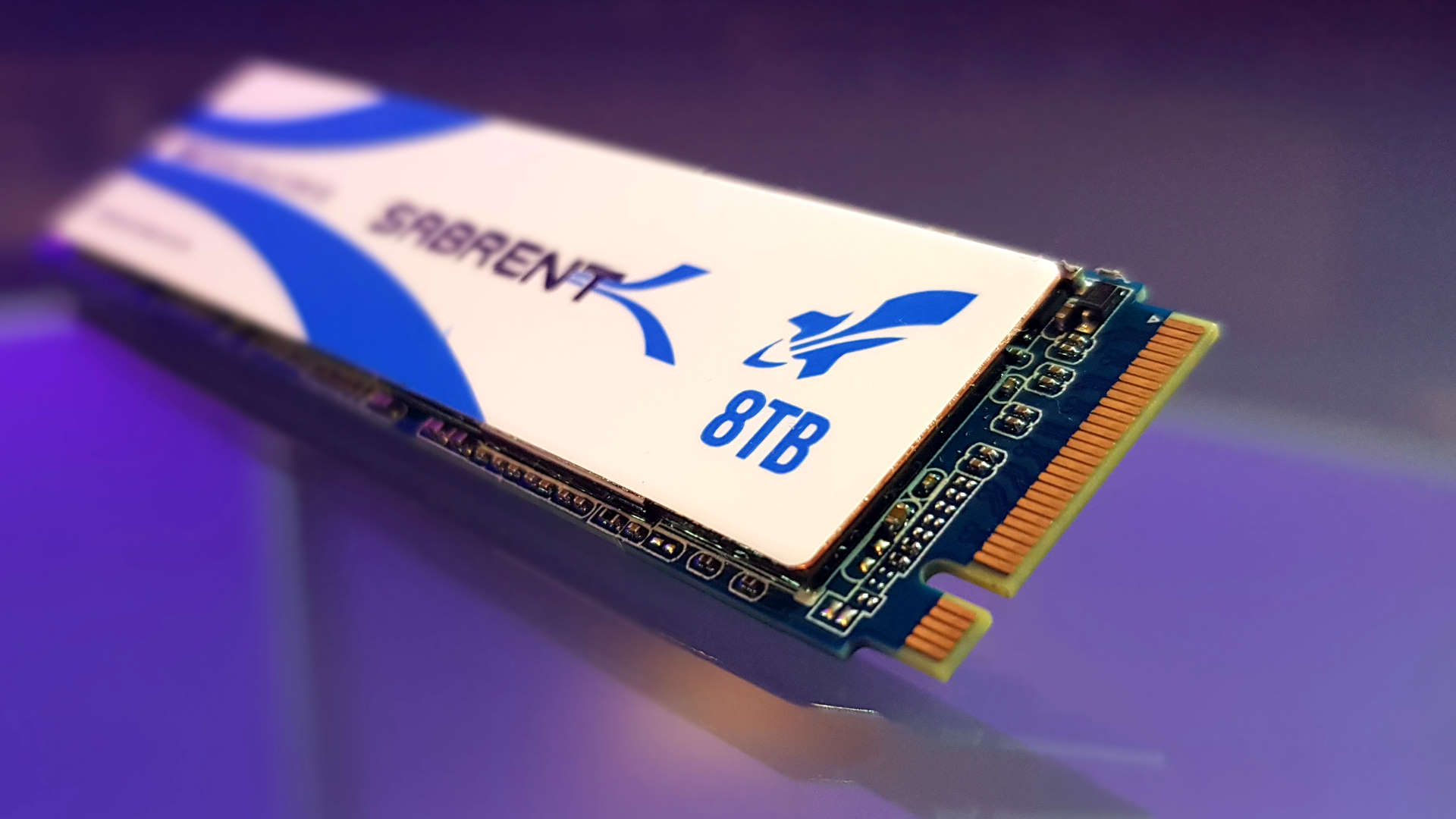
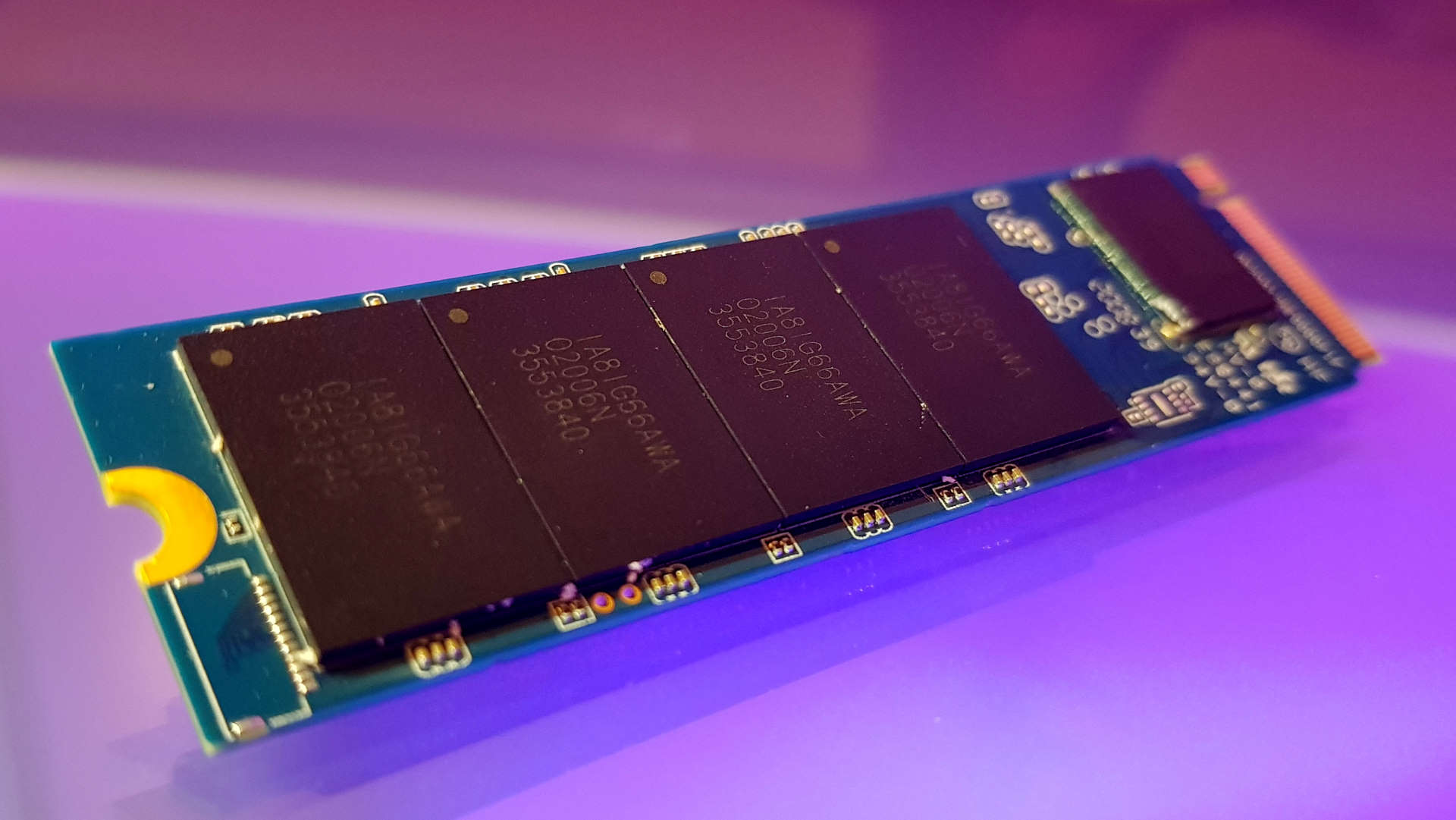
But I still can't help but feel a little disappointed, a little short-changed. An emotion engendered by booting up File Explorer the moment my fresh Windows 10 installation booted on the Rocket Q. I was there to marvel at the capacious storage on offer with this wonderful 8TB drive... and was irked to find just 6.98TB available.
That's more than one whole terabyte MIA. Considering the drive costs $1,500, that feels like almost $190 worth of SSD capacity that you don't get to play with.
But that's not really an issue with the Sabrent Rocket Q itself; it's an issue with SSDs and storage in general, thanks to a mix of overprovisioning and frustrating maths. Smaller storage drives show up with seemingly less capacity in Windows than advertised. A 1TB SSD will have around 930GB actually available, and a 512GB drive might have 475GB. The problem is that with an 8TB drive the extent of that pre-chewed capacity becomes more apparent because of the scale of it.
You're still getting the same percentage of overprovisioning as you'll find with a lot of drives, and then there's the whole maths thing. Yeah, 8TB isn't actually 8,000GB, which isn't 8,000,000MB, and so on. Bytes don't get divided by 1000 to show the larger, abbreviated capacities, they get divided by 1024. For reasons. But the two get mixed up constantly, both in marketing material and by operating systems themselves.
Suffice to say you're not really losing anything extra with a high capacity drive, you'll just notice it more. Hell, 6.98 terabytes is still a whole lot of storage. And in this latest Sabrent Rocket Q you're getting all that and blazing fast speeds with it, despite what you might think about its weak-heart memory tech.
The Rocket Q uses QLC memory to its fullest, using the generally weaker memory tech better than any other drive out there. Mostly thanks to its enormous size.

Dave has been gaming since the days of Zaxxon and Lady Bug on the Colecovision, and code books for the Commodore Vic 20 (Death Race 2000!). He built his first gaming PC at the tender age of 16, and finally finished bug-fixing the Cyrix-based system around a year later. When he dropped it out of the window. He first started writing for Official PlayStation Magazine and Xbox World many decades ago, then moved onto PC Format full-time, then PC Gamer, TechRadar, and T3 among others. Now he's back, writing about the nightmarish graphics card market, CPUs with more cores than sense, gaming laptops hotter than the sun, and SSDs more capacious than a Cybertruck.
